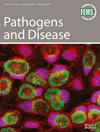AZI2正调控I型干扰素在流感引发的儿童肺炎中的诱导作用。
IF 2.7
4区 医学
Q3 IMMUNOLOGY
引用次数: 2
摘要
5-氮胞苷诱导蛋白2 (AZI2)在抗病毒先天免疫中起着至关重要的作用。本研究旨在探讨AZI2在流感引发的儿童肺炎中的作用及其分子机制。采用qPCR和免疫印迹法测定靶基因和蛋白的水平。采用PR8 H1N1病毒在AZI2胚系敲除(AZI2-/-)和广型(WT)小鼠中建立肺部感染小鼠模型。此外,以HEK293T细胞为基础的荧光素酶报告基因法研究AZI2对I型干扰素的调控作用。采用免疫沉淀法和免疫荧光染色法评价AZI2与TANK结合激酶1 (TBK1)的相互作用。我们观察到轻症状肺炎患者外周血单个核细胞中IFN-I和AZI2的表达升高。有趣的是,AZI2缺乏恶化了流感引起的肺部病理症状,并降低了生存率。进一步表明AZI2正调控I型干扰素、炎症因子和IFN产生相关基因的表达。分子机制数据显示AZI2调控TBK1与TANK的相互作用。综上所述,AZI2通过促进TBK1和TANK之间的相互作用,积极调节流感诱导的儿童肺炎中I型干扰素的产生。本文章由计算机程序翻译,如有差异,请以英文原文为准。
AZI2 positively regulates the induction of type I interferon in influenza-trigger pediatric pneumonia.
5-azacytidine-induced protein 2 (AZI2) is known to have a crucial role in antiviral innate immunity. This study aims to explore the roles of AZI2 in influenza-trigger pediatric pneumonia and its molecular mechanism. qPCR and immunoblotting assays were used to determine the levels of target genes and proteins. The lung infection mouse model was established by using PR8 H1N1 virus in AZI2 germline knockout (AZI2-/-) and wide-type (WT) mice. In addition, HEK293T cell-based luciferase reporter assays were used to investigate the regulatory effects of AZI2 on type I interferon. Immune precipitation and immunofluorescence staining were used to evaluate the interactions between AZI2 and TANK binding kinase 1 (TBK1). We observed an elevation in the expressions of IFN-I and AZI2 in peripheral blood mononuclear cells from the pneumonia patients with mild symptoms. Interestingly, AZI2 deficiency deteriorated the influenza-induced pathological symptoms in the lung as well as reduced the survival rate. It was further showed that AZI2 positively regulated the expressions of type I interferon, inflammatory cytokines, and IFN production-related genes. The molecular mechanism data revealed that AZI2 regulated the interactions between TBK1 and TANK. In summary, AZI2 positively regulates type I interferon production in influenza-induced pediatric pneumonia by promoting the interactions between TBK1 and TANK.
求助全文
通过发布文献求助,成功后即可免费获取论文全文。
去求助
来源期刊

Pathogens and disease
IMMUNOLOGY-INFECTIOUS DISEASES
CiteScore
7.40
自引率
3.00%
发文量
44
期刊介绍:
Pathogens and Disease publishes outstanding primary research on hypothesis- and discovery-driven studies on pathogens, host-pathogen interactions, host response to infection and their molecular and cellular correlates. It covers all pathogens – eukaryotes, prokaryotes, and viruses – and includes zoonotic pathogens and experimental translational applications.
 求助内容:
求助内容: 应助结果提醒方式:
应助结果提醒方式:


